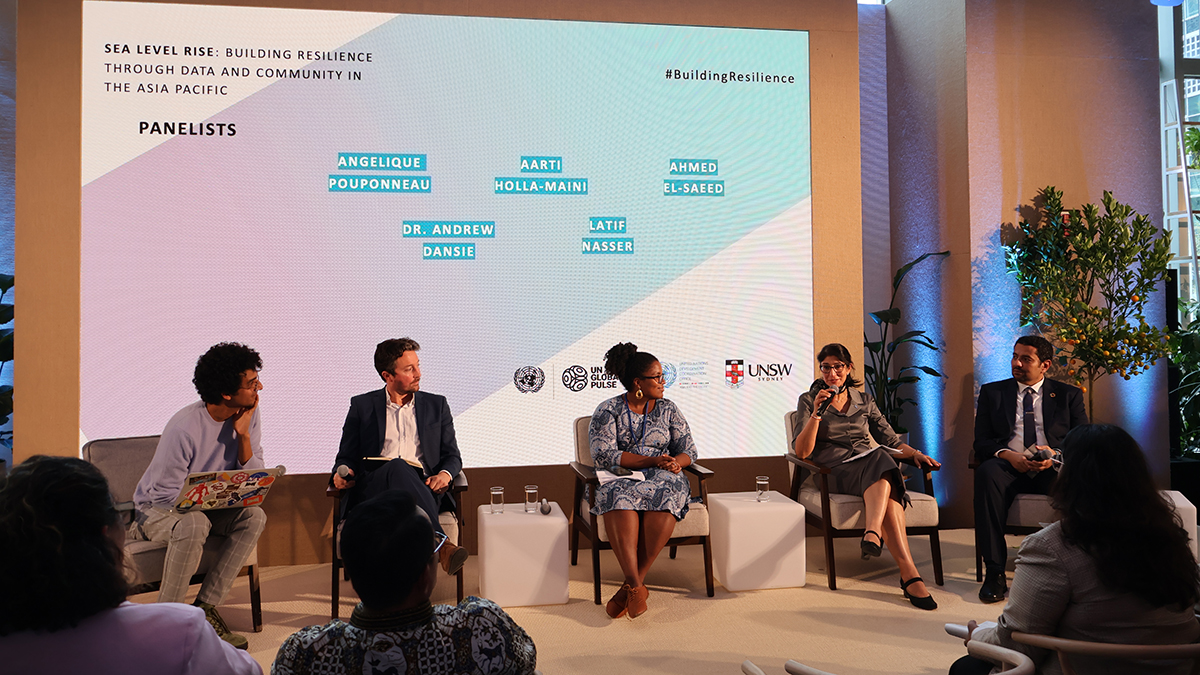
The event presented innovative initiatives from the University in response to the impacts of rising sea levels.
UNSW co-hosted a side event on sea level rise during the United Nations Summit of the Future Action Days in New York in September, in collaboration with UN Global Pulse.
The event highlighted innovative, community-driven and data-based solutions to challenges posed by rising sea levels.
Hosted by the UN Secretary-General, the Summit of the Future brought together global leaders to build a new international consensus for a better future.
The urgency of rising sea levels
Rising sea levels are already affecting coastal regions worldwide, with the Asia Pacific particularly vulnerable.
During the side event, Senivasa Waqairamasi, Deputy Secretary for Climate Change from the Government of Fiji, stated that rising sea levels are not just an environmental issue for small island nations, but also threaten traditional cultures and ways of living.
Echoing these concerns, Tri Tharyat, Director General for Multilateral Cooperation from Indonesia, noted the impact on his country’s extensive coastline, with over 17,000 islands at risk. He called for the strengthening of adaptation and mitigation efforts, promotion of robust diplomatic tools, and enhanced international cooperation.
With experts warning that sea levels will continue to rise for centuries despite efforts to reduce global warming, enhancing the resilience of coastal communities is an urgent global priority.
As UN Under-Secretary-General and Executive Director of UNOPS, Jorge Moreira da Silva, underscored in his opening remarks, “Sea level rise is a global challenge that demands immediate action and innovative solutions. We must work together to implement resilience-building initiatives that protect vulnerable communities and promote sustainable development for future generations.”
Showcasing solutions
Responding to these calls, the UNSW event showcased key initiatives from the University, including Project Halophyte and the Global Ocean Accounts Partnership, alongside efforts from UN Global Pulse Asia Pacific.
Dr Andrew Dansie presented insights from Project Halophyte, a five-year mangrove research and rejuvenation program in Fiji.
He emphasised the importance of community-driven, nature-based solutions.
“These solutions must support the high ambition and leadership of the Pacific while empowering local landholders and communities. The Pacific serves as an ambitious and forward-thinking pilot region, demonstrating how these principles can guide mutually beneficial efforts of meeting both carbon and humanitarian development goals in the Asia Pacific and beyond.”
Angelique Pouponneau, representing the Global Ocean Accounts Partnership secretariat, hosted by the UNSW Centre for Sustainable Development Reform, emphasised the transformative potential of ocean accounting.
“Ocean accounts offer a paradigm shift in how we measure and value our blue economies,” she explained.
“By going beyond GDP, we can capture the true wealth of our oceans, including their ecological and social value. This comprehensive approach enables policymakers to make more informed decisions that balance economic growth with environmental sustainability and community well-being.”
Ahmed El Saeed, Regional Head of UN Global Pulse Asia Pacific, underscored the transformative role of artificial intelligence and big data.
“These technologies offer unprecedented opportunities to develop more informed and responsive adaptation strategies in the face of rising sea levels. We can only do this through partnerships,” he said.
UNSW’s knowledge partnership with the United Nations
The side event in New York built on UNSW’s ongoing knowledge partnership with the UN Development Coordination Office – Regional Office for Asia Pacific (UNDCO–ROAP).
Through this partnership, we have jointly curated and convened interactions in Australia, Fiji, Indonesia, Papua New Guinea, Thailand and Timor-Leste since 2022.
Prof. Colin Grant, UNSW Deputy Vice-Chancellor Global, said, “UNSW stands as a global research and education leader, committed to working with key partners. Our collaboration with the UN has focused on supporting community-driven outcomes and accelerating sustainable development across the Asia-Pacific. Our work with UN Global Pulse on this event reflects our enduring commitment to societal impact throughout the region and beyond.”
Ayaka Suzuki, Director of Strategic Planning at the UN Executive Office of the Secretary-General, highlighted the value of these partnerships.
“Knowledge partnerships with academia are crucial to the UN’s mission, providing the research insights and innovative solutions needed to address global challenges,” she said.
Earlier this year, UNSW partnered with the UN to convene a high-level interaction at the Global Sustainable Development Congress.
Prof. Bruce Watson, UNSW Pro-Vice Chancellor Inclusion said: “As a global university deeply committed to positive societal transformation, UNSW’s participation in these forums reflects our dedication to creating a more inclusive, equitable, and better future. By bringing diverse voices and ideas to the world stage, we aim to inspire meaningful progress for all communities.”
During their visit, the UNSW delegation also engaged with UNAIDS and UNDP as well as Australia’s permanent mission to the UN. UNSW’s relationship with UNAIDS started during the HIV crisis more than 20 years ago, in partnership with The Kirby Institute.
Visit UNSW Institute for Global Development for more information about our collaborative work with the UN.
Main image: (L to R) Latif Nasser and panellists Andrew Dansie, Angelique Pouponneau, Aarti Holla-Maini and Ahmed El-Saeed.
- Log in to post comments
